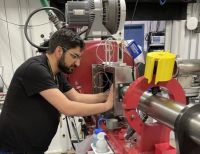Though our COVID-19 vaccines are known to provide robust immunity, researchers still don't know how long that protection lasts—and whether booster shots will be required in the future. The rise of new variants further complicates matters.
In a recent Q&A with The Los Angeles Times, Johns Hopkins vaccine expert Kaswar Talaat explains how scientists are approaching the issue of boosters while awaiting data from ongoing vaccine trials.
Talaat, an associate professor of international health in the Bloomberg School of Public Health and co-director of clinical research at the Johns Hopkins Institute for Vaccine Safety, says understanding so-called "breakthrough cases," when fully vaccinated people fall ill, could be key to determining whether boosters will be needed.
We know breakthrough cases do happen, so we'll also be monitoring them to understand who gets them and what variants they have. If we see an uptick of breakthrough cases in populations that are fully vaccinated, that would be cause for concern because either immunity has waned or there is a variant that has escaped.
It's entirely possible, Talaat says, that a new vaccine targeting a stray variant may be needed, but for now, the most prudent measure would be to focus on vaccinating as many people as fully as possible—which would have the added benefit of preventing future variants.
Additionally, Talaat says vaccine trials are ongoing and still collecting data on participants' immune responses. Developers will be paying close attention to two vaccine effects: an immune response, characterized by the development of effector cells that attack the virus, and a memory response, characterized by the development of memory cells. "Memory cells live a long time and protect you even after those effector cells are gone. If the virus enters the body, they say, 'I know what this is,' and spin off and divide to make new effector cells to fight the infection," Talaat says.
The ability of a vaccine to produce a prolonged memory response also determines whether boosters are needed.
Read more from Los Angeles TimesNinety percent of us are protected essentially our whole lives from measles after getting that vaccine. The second dose is not to boost the immune response but instead to capture half of the people who didn't respond to the first vaccine.
On the opposite end, the flu vaccine does not induce a good memory response, so the immune response to the flu vaccine is short-lived. Even if the strains didn't change every year you would need another shot.















